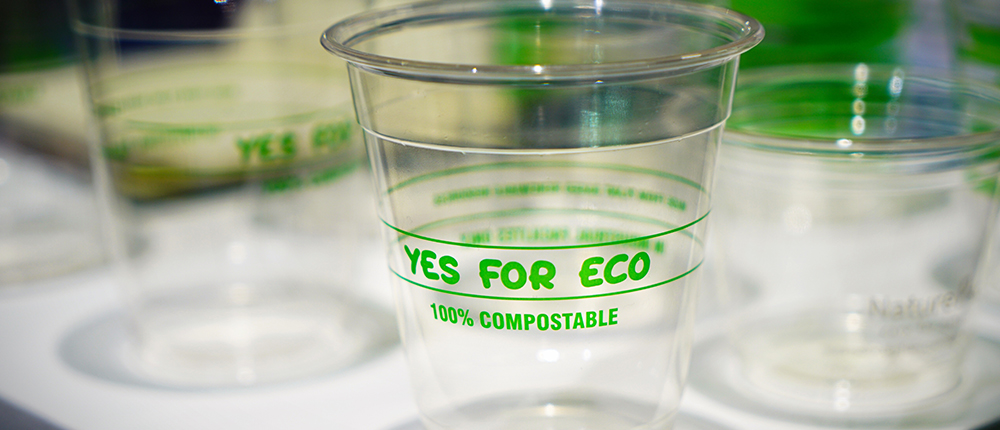Environmental pollution due to commercial plastic waste mismanagement has been compounding, making it crucial to find an alternative. The article highlights TERI's bioplastic research and how bio and bio-based plastics could act as a sustainable alternative to conventional plastics.

From packaging in industrial and commercial sectors, to medical application at hospitals, and storage at homes, commercially available plastics (synthetic plastics) have entered almost every sphere of our lives despite the short span of time in human history in which they've existed. "Due to their ease of production, processing, mouldability, almost inert nature, and light weight, plastics have found usage in various fields," said Dr R R N Sailaja, Senior Fellow at the Environment & Waste Management Division of The Energy and Resources Insititute (TERI) Southern Regional Centre in Bengaluru.
However, despite their multitude of uses and conveniences, usage of petroleum-based plastics are accompanied by a range of environmental issues. Dr Sailaja said, "With the host of applications that plastic offered due to its properties, its production boomed. But what we didn't know in all this was how to deal with the waste."
Almost half of the plastic produced around the world is single-use plastic.1 From straws to packaging material, this plastic not only dominates mounds of non-biodegradable waste but is also amongst the most difficult to manage and recycle. Managing this waste is where TERI's work comes in.
"We (at TERI's lab in Bengaluru) have worked on producing prototypes of disposable cups and plates (to replace plastic ones) developed through soy-based nanocomposites which are 100% biodegradable. Similarly, we have been able to produce transparent biodegradable films using modified starch for the purposes of packaging dry products," Dr Sailaja said.
Since a large section of the plastic waste is single-use plastic, working towards replacing products in this segment with bioplastic composites can be of significant value.
"Bioplastic composites are made entirely of natural polymers (plant or animal based) and are completely biodegradable. Our work on bioplastics targets this short-term application to improve resource utilisation and reduce our waste and carbon footprint. We have been working on bio-polymeric blends for moulded products and completely bio-based nanocomposites for fully biodegradable use-and-throw cutlery and packaging. By fine tuning the process, we can tailor the bioplastics to suit varied purposes," she added.

Today, the world produces 300 million tonnes of plastic waste every year, which is close to the weight of the entire human population.2 This plastic takes over 400 years to degrade. Thus, having a sustainable alternative in bioplastics that take significantly less time to decompose not only benefits the environment, but also reduces the stress on land resources due to lesser landfills and recycling centres.
Another way to deal with the difficult-to-manage plastic waste that we produce was to mix it with naturally obtained renewable polymers to make bio-based plastics. They are not simply a blend of synthetic (fossil fuel-based) and natural (plant or animal-based) polymers. While they do contain around 60% synthetic polymers and more than 40% bio polymers to maintain strength, their production involves including several additives and auto oxidants to facilitate the degradation of both the natural and synthetic part," Dr Sailaja explained.
Then what makes bio-based plastics any better than synthetic plastics if they both contain fossil fuel-based polymers?
"Microbes in our soil and natural surroundings attack the natural part of the bio-based plastic and degrade it while ultraviolet rays from the sun facilitate chemical degradation of the synthetic part through oxidation. This way bio-based plastics take significantly less time to degrade, in turn making the waste easy to manage," she said.

She added that TERI has recorded their degradation to be between six to seven months in lab tests. While the environment friendly nature of bioplastics and the relatively low carbon nature of bio-based plastics is encouraging, it is important to understand the viability of their real-world application and possible use cases.
While the work is still in lab scale, the results highlight the huge potential of bioplastics and bio-based plastics in achieving long-term climate action goals. Not only do these present a greener and more sustainable solution to our plastic waste problem, but also reduce our dependency on fossil fuels-based plastics. In 2020 alone, it is estimated that more than 97% of the plastics generated in the world were derived from fossil fuel resources (mainly petroleum-based resources).3
However, there are still some issues to be worked out.
"This industry is still emerging. Also, while producing bioplastics is relatively inexpensive when compared to microbial plastics, the process is still not as cost effective as producing synthetic plastics. Further, the fact that bioplastics are not at a par in strength and durability with synthetic plastics whose shelf life is years-long adds to the reluctance in its widescale adoption. As plant or animal-based material is a key ingredient in bioplastics, making them hydrophobic (water repellant) is still a work in progress," Dr Sailaja said.
"Strong policies, research and development (R&D) investments, and subsidies from the government will help strengthen the bioplastic industry. Additionally, a more open approach is needed from different sectors of the Indian industry, both in terms of financial investments for R&D and encouraging adoption of the technology, as their cooperation will make these products more accessible," she added.
Plastic waste pollution has long cast a shadow on the versatility of plastics as a material. With its centuries long span of degradation, and its gross mismanagement having lasting effects on the environment, dealing with plastic waste has become paramount. Since most of the recycling of plastic in India is done by the informal sector, the chances of it being downcycled are much higher. As a result, bioplastics and bio-based plastics that are friendlier to the environment and require lesser efforts to degrade present themselves as viable alternatives. The growing heaps of plastic waste in landfills and roadside dumps, and the various other issues emerging from plastic use, make the option of switching to bioplastics and bio-based plastics look even more attractive.
Footnotes:
[1] & [2] https://www.unep.org/interactive/beat-plastic-pollution/
[3] http://www.chem4us.be/plastics-and-bioplastics-a-200-year-history-of-research-and-development/#_ftn5


